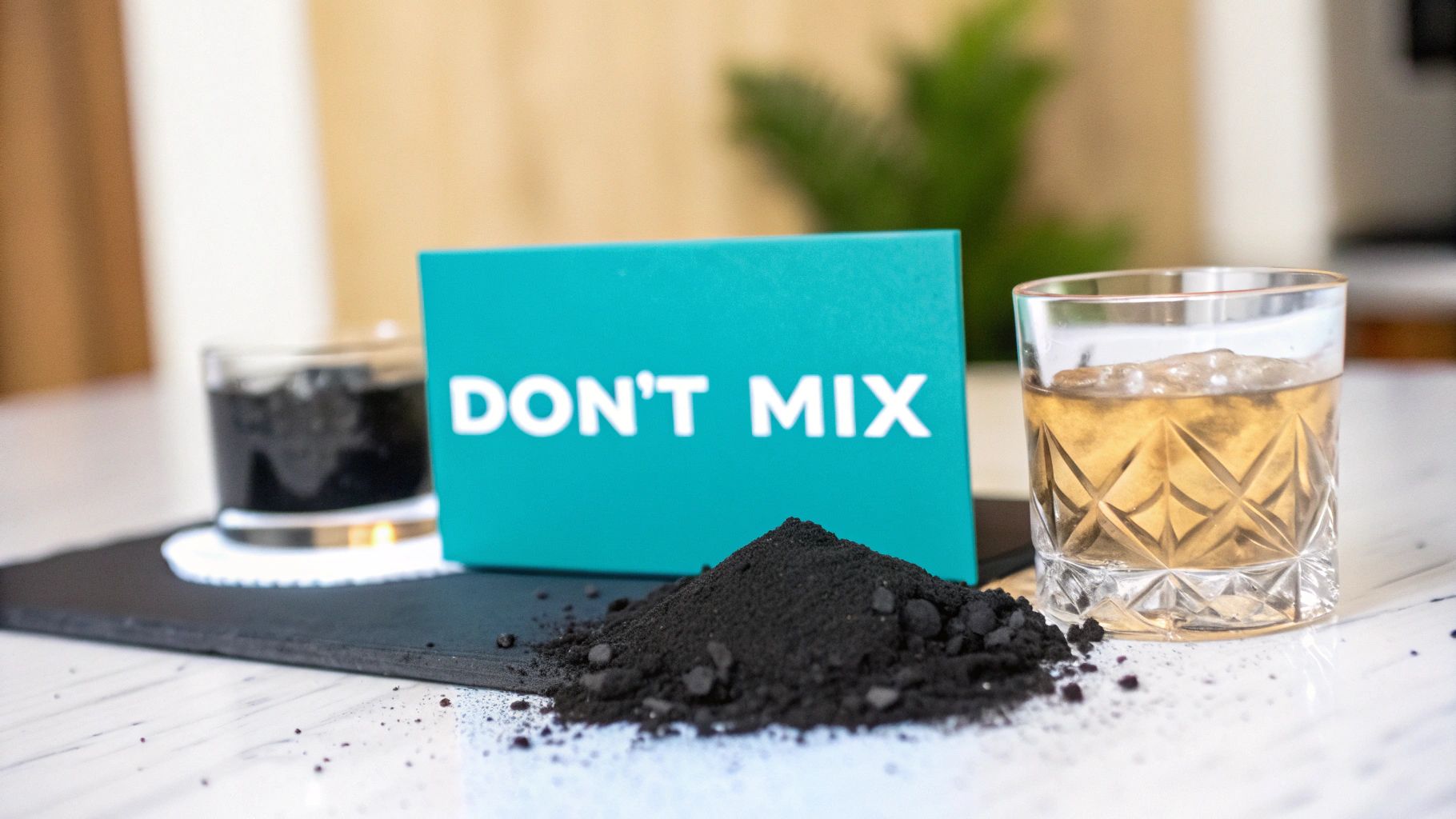

· By Annemarie
Activated Charcoal and Alcohol Don't Mix
You've probably seen it touted online as a miracle hangover cure, but what's the real deal with activated charcoal? Let's cut to the chase: activated charcoal and alcohol don't mix the way you'd hope they would.
While it’s an absolute powerhouse for absorbing certain toxins, alcohol is absorbed by your body way too fast for charcoal to catch up and make a difference for your blood alcohol content—or that dreaded next-day hangover.
Why Activated Charcoal Fails as a Hangover Cure
The idea that you can pop a charcoal pill to "soak up" a night of drinking is one of the most stubborn wellness myths out there. It makes sense on the surface, since activated charcoal is famously used in emergency rooms for some types of poisoning. But when it comes to alcohol, the science tells a completely different story.
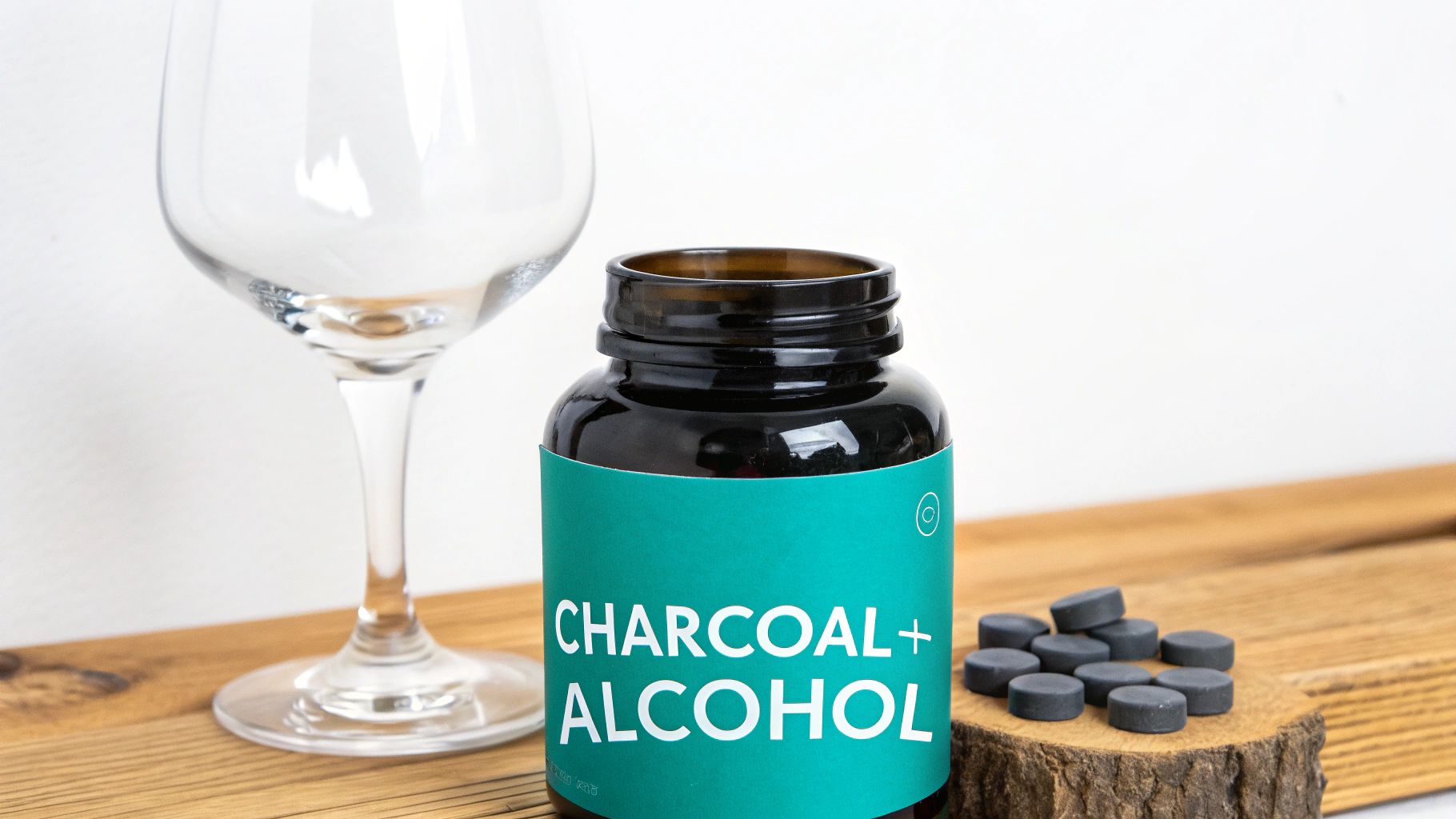
Think of activated charcoal like a super-porous sponge. It’s covered in millions of tiny nooks and crannies that are perfect for trapping large, clunky molecules. This process is called adsorption, where substances literally get stuck to the charcoal's surface, keeping them out of your bloodstream.
Here’s the problem: alcohol molecules are tiny. They’re small, simple, and they slip right past charcoal’s net.
Instead of getting trapped, alcohol gets absorbed almost instantly through the lining of your stomach and small intestine. By the time you swallow a charcoal pill, most of the alcohol from your drink is already cruising through your system.
The bottom line is that the idea of charcoal "mopping up" excess alcohol is just scientifically off. Once alcohol hits your stomach, it absorbs so quickly that charcoal has virtually no chance to intercept it.
This isn't just theory, either. A landmark study from 1986 put this to the test and found no real difference in blood alcohol levels between people who took activated charcoal and those who just drank water. Why? Because ethanol simply isn't a substance that charcoal can effectively bind to once it's in your system. You can read the full research about these findings if you want to dig into the science.
Here’s a quick breakdown of what science says about activated charcoal's effect on alcohol.
Activated Charcoal vs Alcohol Quick Facts
| Factor | Scientific Finding |
|---|---|
| Binding Ability | Activated charcoal binds poorly to alcohol (ethanol). |
| Molecule Size | Alcohol molecules are too small to be effectively trapped by charcoal's pores. |
| Absorption Speed | Alcohol is absorbed into the bloodstream faster than charcoal can act on it. |
| BAC Impact | Studies show it does not significantly reduce blood alcohol concentration (BAC). |
| Hangover Prevention | Ineffective at preventing hangovers because it doesn't address the root causes. |
Ultimately, relying on activated charcoal to prevent a hangover is like trying to catch mist with a fishing net—it’s just not the right tool for the job.
How Activated Charcoal Actually Works
To really get why activated charcoal and alcohol don't mix, we first have to understand what makes the stuff so powerful in other situations. We're not talking about the briquettes from your backyard barbecue, by the way. Activated charcoal is made by blasting carbon-heavy materials, like coconut shells, with insanely high heat, which creates millions of tiny, microscopic pores.
Think of it like a massive, complex coral reef. From a distance, it looks solid, but get up close and you'll see it’s a maze of nooks and crannies. Activated charcoal is the same deal, giving it a ridiculously huge internal surface area. This sprawling, porous network is its secret weapon, letting it trap certain substances through a process called adsorption.
The Power of Adsorption
Now, adsorption isn't the same as absorption. Instead of soaking up toxins like a sponge (that's absorption), activated charcoal is more like a magnet. Certain chemicals and toxins are literally drawn to its surface, where they get stuck and are then escorted out of the body.
This is exactly why it’s a go-to in emergency rooms for treating specific types of drug overdoses or poisonings. The charcoal latches onto the harmful stuff in the stomach before it ever gets a chance to hit the bloodstream.
This infographic gives a great visual of how activated charcoal works on different things inside the body.
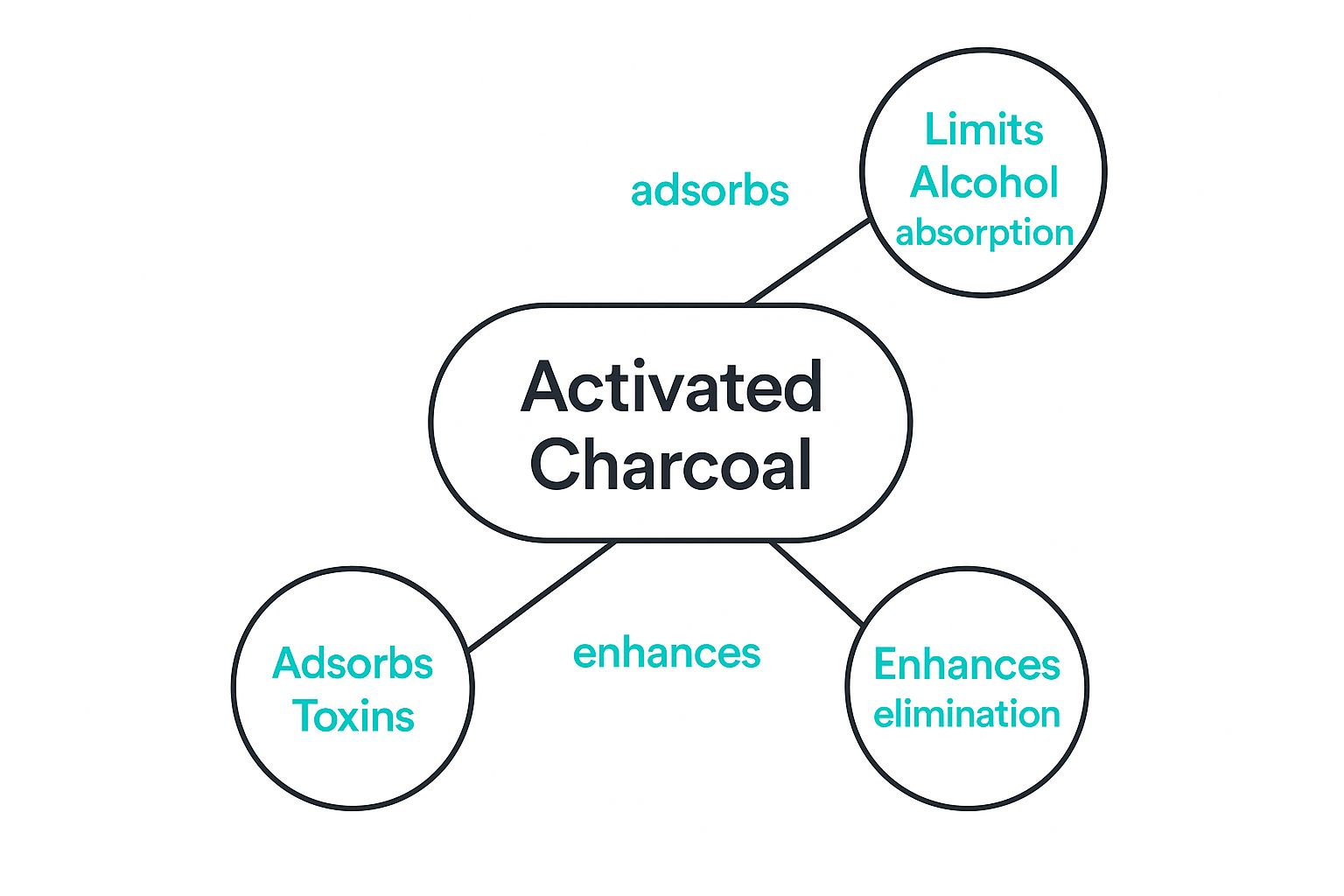
You can see its main strength is grabbing onto toxins, but it also shows its major weakness when it comes to alcohol.
Basically, activated charcoal is a highly specialized tool built to trap big, complex molecules. Its success completely depends on what it's trying to catch.
This whole process is completely different from how your body handles alcohol. Unlike the large molecules charcoal is a pro at trapping, alcohol molecules are tiny and get absorbed super fast—kind of like the whole debate around whether does food soak up alcohol. Getting this difference is key to understanding why charcoal just doesn't work as a hangover cure.
The Science of Why Charcoal Fails With Alcohol
When you take a drink, alcohol absorption isn't a slow, leisurely process—it's a race against the clock. And it's a race that activated charcoal is biologically guaranteed to lose.
The journey of ethanol from your glass to your bloodstream is incredibly fast. Getting a handle on this speed is the first step to understanding why the whole charcoal-for-hangovers idea just doesn't work.
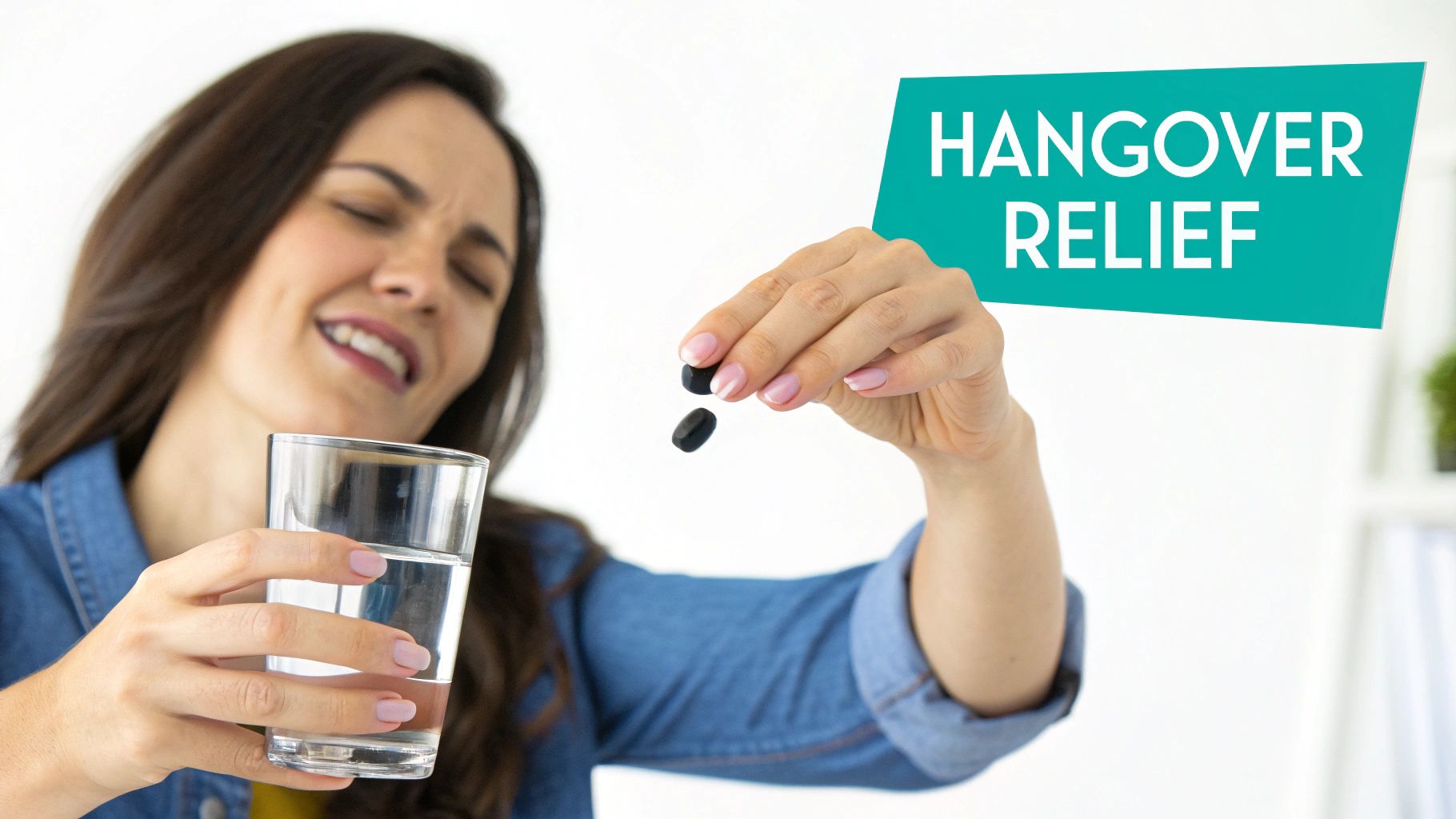
Unlike the big, clunky toxin molecules that charcoal is great at trapping, alcohol (ethanol) molecules are tiny. They're so small, in fact, that they get absorbed directly through your stomach lining and small intestine almost as soon as they arrive.
This means by the time you’d even think about swallowing a charcoal pill, a huge chunk of that alcohol is already in your bloodstream, making a beeline for your liver. The charcoal just shows up way too late to the party.
The Problem of Speed and Size
The relationship between activated charcoal and alcohol is flawed at a basic chemical level. It isn't just about timing; it's about a fundamental mismatch.
Think of it this way:
- Charcoal's Net: Imagine activated charcoal is a big fishing net with specific-sized holes, perfectly designed to catch large fish (aka, toxins).
- Alcohol's Size: Now, picture alcohol molecules as tiny plankton. They simply drift right through the net's holes without ever getting snagged.
This is exactly why one human study after another has shown that taking activated charcoal does not significantly lower your blood alcohol concentration (BAC). The physical properties just don't line up for it to work.
Scientific evidence consistently shows that activated charcoal is ineffective at binding to ethanol once ingested. The rapid absorption of alcohol into the bloodstream leaves no meaningful opportunity for charcoal to intercept it.
The way your body breaks down a drink is a complex, multi-step process. You can dive deeper into the full journey in our guide on how your body processes alcohol.
But when it comes to the science of activated charcoal and alcohol, the verdict is in. It’s a failed strategy built on a misunderstanding of how both substances actually behave inside the body.
Charcoal’s Surprising History in the Alcohol Industry
It turns out activated charcoal has a fascinating, and pretty important, history with the very spirits many of us enjoy. But its role isn't what you might think. Long before it became a wellness trend, charcoal was the secret weapon of distillers, used to refine and perfect drinks.
Its job wasn't to undo a night of drinking, but to help craft a better, smoother drink right from the start.
This isn't some new-age trick. Distillers have been using charcoal filtration for centuries to strip out all the nasty stuff that can make spirits taste harsh or look murky. Think of it as the ultimate quality control expert, ensuring the final product is clean, smooth, and exactly what the distiller intended.
The Master of Purification
The main gig for charcoal in distilling is filtration. When a newly made spirit is passed through a charcoal filter, its incredibly porous surface gets to work.
- Color Removal: It can strip away unwanted color from spirits like rum and tequila, leaving them with that crystal-clear, clean look.
- Impurity Filtration: It grabs onto all sorts of organic compounds and other gunk left over from fermentation, smoothing out any harsh notes.
- Flavor Refinement: By pulling out all those undesirable elements, it lets the real, intended flavors of the spirit shine.
This whole process even has a name: charcoal mellowing. It’s a signature step for some of the biggest brands out there, especially in the whiskey world. It’s a perfect example of charcoal’s power to refine rather than remedy.
This isn't a recent discovery, either. People have been onto this for a long time. Chemists were documenting charcoal's ability to decolorize booze way back in 1785. By the early 1800s, it was a standard technique across Europe for refining sugar to produce purer spirits.
The first commercial production of activated charcoal for this exact purpose kicked off in 1909. You can dive deeper into the science and history in this USDA technical report on activated charcoal if you really want to geek out.
Why Charcoal Still Pops Up in Hangover Supplements
If science says activated charcoal is basically useless for soaking up alcohol, you might be wondering why you still see it in so many "hangover cures." The answer is that supplement makers have gotten a bit more creative.
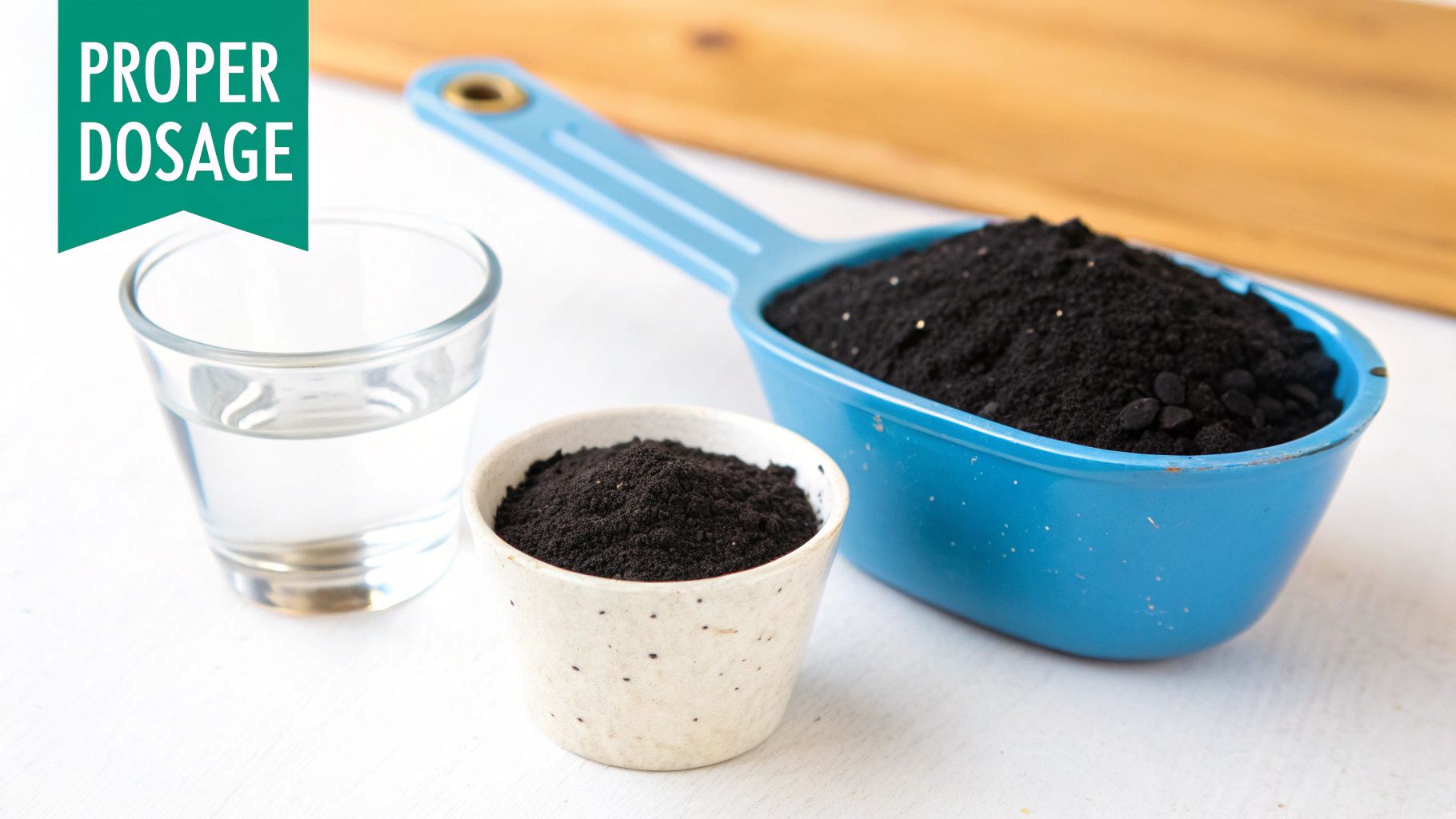
Instead of claiming to absorb the alcohol itself, the new theory is that charcoal can latch onto other nasty stuff in your drink. We're talking about congeners, the chemical byproducts left over from fermentation.
These compounds are especially common in darker liquors like whiskey, rum, and red wine. Congeners are notorious for making hangovers feel so much worse. The thinking is that while the charcoal won't stop you from getting drunk, it might be able to grab some of these congener molecules in your stomach and lessen the misery you feel the next day.
The “Kitchen Sink” Approach
Most modern hangover supplements don't just bank on charcoal alone. They often throw in the "kitchen sink," bundling charcoal with a whole cocktail of other ingredients. They’re selling a mix of vitamins, minerals, and electrolytes designed to help your body recover from a few different angles.
You can see this strategy in various patented formulas. One patent, for example, combines activated charcoal with limestone and vitamin B1 in tablets meant to reduce hangover symptoms. In these kinds of products, charcoal can make up anywhere from 20% to 80% of the formula, mixed in with B vitamins and other rehydration aids. You can check out the full anti-hangover patent here to see how they're pieced together.
By loading up a supplement with multiple ingredients, the goal is to offer support, not a direct cure. The charcoal is there to hopefully tackle congeners, while the vitamins and electrolytes are meant to replenish what your body loses during a night of drinking.
Ultimately, this positions charcoal as just one piece of a much larger wellness puzzle. For a closer look at how these multi-ingredient formulas work, you might want to read our guide on pre-hangover pills.
While the jury is still out on whether charcoal is truly effective against congeners, its inclusion shows a more nuanced—and frankly, more marketable—way of tackling the dreaded hangover.
Answering Your Questions About Charcoal and Alcohol
Let's cut through the noise. When it comes to hangover remedies, there's a lot of confusing info out there, especially around activated charcoal. To clear things up, here are some straight-up answers to the questions we hear all the time. This is the practical, science-backed stuff you need to party smarter.
Can I Take Activated Charcoal Before Drinking?
It sounds like a clever pre-party hack, right? Pop some charcoal before a night out and you're good to go. Unfortunately, it just doesn't work that way.
Alcohol gets absorbed into your bloodstream almost instantly—we're talking minutes after that first sip. It's practically impossible to time a charcoal dose to actually catch the alcohol before your body absorbs it.
Study after study has confirmed this. Even when taken right around the same time as alcohol, activated charcoal has no significant effect on your blood alcohol levels. Relying on it just gives you a false sense of security, which is the last thing you want on a night out.
Are There Any Risks to Taking Charcoal With Alcohol?
Yes, and they're pretty serious. Activated charcoal is like a sponge that isn't picky about what it soaks up. It's a non-selective binder, meaning it grabs onto a whole bunch of different things in your stomach.
Here's the biggest issue: that "soak up everything" quality means it can bind to crucial medications like birth control, antidepressants, or heart medicine. This can make them completely ineffective, leading to some really dangerous health problems.
And it doesn't stop there. Charcoal can bring on its own set of nasty side effects:
- Dehydration: It can pull water into your gut, making the dehydration from alcohol even worse.
- Constipation: It’s notorious for causing blockages. Not exactly what you want to deal with when you're already feeling rough.
- Nutrient Blocking: It can also glom onto vitamins and minerals from your food, stopping your body from getting the good stuff it needs.
Bottom line: given the risks, you should always talk to a doctor before even thinking about using activated charcoal, especially if you're on any kind of regular medication.
So, What Are Better Ways to Prevent a Hangover?
The best ways to dodge a hangover aren't found in a trendy supplement bottle. They're simple, proven strategies that support your body's natural ability to handle a night out.
Instead of looking for a shortcut, focus on the basics that actually work. Hydration is king—try to have a glass of water between each alcoholic drink. Never drink on an empty stomach; a solid meal slows down how fast you absorb alcohol.
And honestly, the most reliable tools in your hangover-prevention kit are pacing yourself (aim for about one drink per hour) and getting a good night's sleep. Your body will thank you way more for that than it ever would for a dose of charcoal.
Instead of relying on unproven hacks, why not try a solution designed to support your body's natural recovery process? Upside offers a delicious, convenient jelly packed with science-backed ingredients to help you feel your best after a night out. Party smarter and wake up brighter by checking out our hangover sticks at https://enjoyupside.com. #upside #enjoyupside #upsidejelly #livemore #hangovercure #hangoverprevention #fighthangovers #preventhangovers #HangoverRelief #MorningAfter #PartySmarter #HydrationStation #WellnessVibes #RecoverFaster #NoMoreHangovers #HealthyParty #HangoverHacks #FeelGoodMorning #NightlifeEssentials #HangoverFree #SupplementGoals #PostPartyPrep #GoodVibesOnly #HealthAndParty #HangoverHelper #UpsideToPartying
